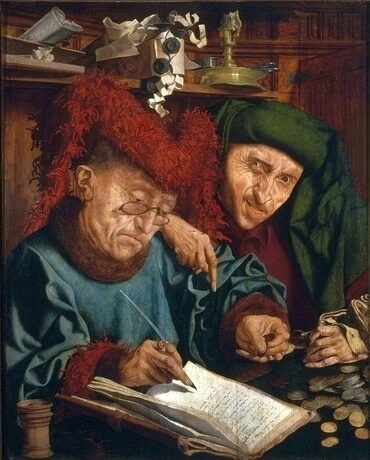
This parable in Luke 16:1-13 has for centuries caused confusion and consternation for Biblical commentators. The steward has been wasting his master’s goods, and under threat of being fired goes scrambling around settling debts on the cheap. His motivation is rotten – he does it to ingratiate himself with the debtors so they will take him in after he loses his job. And for this he gets praised!
Jesus then proceeds to say that worldly men are wiser than enlightened, angelic ones, and advises us to embrace ill-gotten wealth – and then, in a seeming contradiction, tells us we cannot serve both God and mammon. Huh? Didn’t he just tell us to serve mammon?
Understood on an internal level – through the Writings of Emanuel Swedenborg – the story makes much more sense.
Let’s say your church decides to start a Sunday night Bible study. The pastor notes that this is part of the Sabbath, and there should be no excuses. He also encourages participants to buy a study guide which he wrote and the church is selling.
You find this troubling. You and your wife read and study the Bible together; you’ve taken part in some other Bible studies, but don’t like feeling coerced. What’s more, Sunday is the one day all your children are home, and you have a tradition of Sunday dinners that tend to evolve into long, rich conversations. You and your wife talk about it, and decide to keep your family tradition instead.
This leads to some pressure. The pastor keeps calling to remind you of the study nights, and you keep catching snide remarks from other members. Finally you tell the pastor that the reaction is hurtful and unwarranted, and you might decide to seek another church.
You tell this to a friend, and his reaction is unexpected. “I hear what you’re saying,” he says, “and I might be right with you someday. But for me, I’d never gone to a Bible study before. I always figured that I knew all the stories, and I was busy, I was tired, all that stuff. But I really couldn’t argue with the fact that it is the Sabbath. So I went, and you know, I’m seeing things in the Bible I never saw before. I mean, I knew all the stories, but now I’m seeing ways I can apply it to my life.”
That, in essence, is the parable of the unjust steward. In this example, “you” are the rich man, with a wealth of spiritual knowledge which you’ve confirmed in your life. The church is the steward, who represents external ideas about religion, based in truth but not necessarily filled with a desire for good. You can see that he is wasting your goods – the church’s ideas are hampering your ability to live the best life you can.
Your friend, meanwhile, is a debtor – someone with a collection of knowledge from others, but not confirmed as part of life. Pressured into the Bible study, he starts confirming some of the knowledge he has and applying it to life – akin to the debtors “writing” down lesser amounts, which represents confirming themselves in intermediate spiritual states.
The explains, then, why the steward was praised. Despite his limits, he found a way to be useful – and in doing so made a move toward improving his spiritual state.
That brings us to the mysterious line, “the sons of this world are more shrewd in their generation than the sons of light.” This means that if we are in external states (“this generation”) – which the steward was, and the debtors were – the most effective tool for us is going to be external thought and knowledge (“sons of this world”). That’s what the steward got from the debtors, and what the debtors got from steward. They shared external things, to the benefit of both.
And what of “making friends with unrighteous mammon”? “Unrighteous mammon” is truth and knowledge possessed by evil people. To “make friends” with it is making a connection to the truth and knowledge without embracing the evil. Which, again, is something the steward and the debtors did for each other.
So the Lord here is telling us that if we are in a worldly state and want to become more spiritual, we need to collect true ideas from the world around us – even an evil world – and make use of them.
But we do have to be careful. When we’re seeking truth that is infused with evil, it’s easy to embrace both instead of separating them. So we need to be aware of which master we’re really serving – do we love the truth and feel an aversion to the evil? Or do we justify the evil and regard the truth as unimportant? That will tell us whether we’re serving God or mammon.
Here are some references:
Arcana Coelestia 9093, 9210[3];







